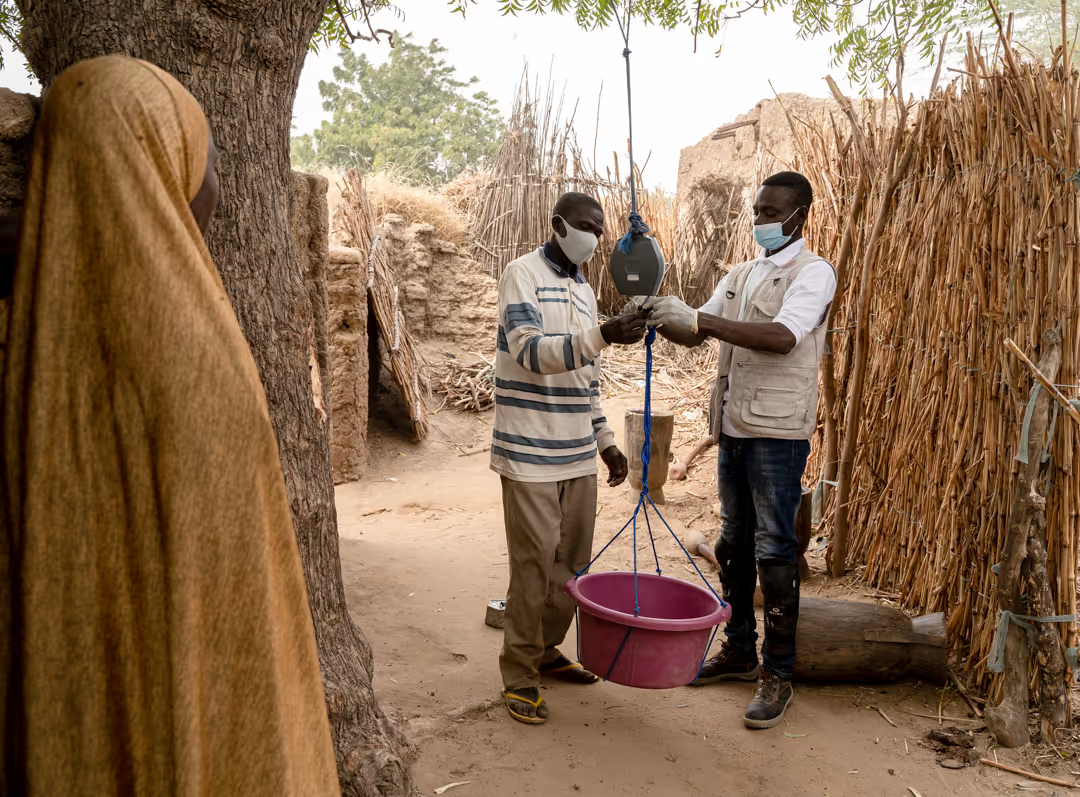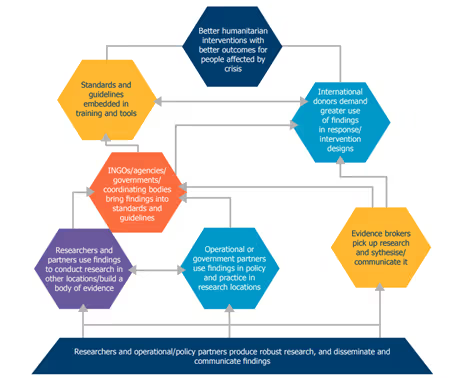Bridging the gap: anouncing R2HC’s uptake and impact small grants

For research to have real impact on humanitarian policy and practice, investing in the dissemination, engagement and communication of findings is crucial. This stage of the research impact pathway, known as ‘research uptake’, is key to enabling the understanding and application of evidence among target audiences, and for shaping policies and practices.
In humanitarian contexts there is a significant funding gap hindering effective research uptake activities. The gap exists on both the demand and supply sides of humanitarian research – an issue we explored in our 2021 learning paper From Knowing to Doing.
On the demand side, the humanitarian sector faces limitations in terms of time, money, and capacity for evidence uptake, learning, and knowledge translation. The distribution of these resources is also uneven, usually concentrated in the high-income country headquarters of international organisations, leaving critical needs unmet.
On the supply side, academic researchers also encounter disincentives and resource constraints to delivering activities that facilitate uptake of their research findings. These constraints can emerge from institutions and working circumstances, even when researchers are eager to contribute to strengthening humanitarian programming. Uptake activities are often costly, requiring regular, substantive engagement with humanitarian stakeholders and ‘broker’ intermediaries who may be busy attending crises, scattered globally, or facing their own resource constraints.
Operational challenges, staff turnover, limited resources, and rapidly changing priorities in response to emerging needs all hinder and complicate the humanitarian research-to-change pathway (see image below).

To address this gap, we initiated our first Uptake and Impact Small Grants call for proposals in 2023. This opportunity was exclusively open to previous and existing R2HC-funded study teams, encouraging them to apply for additional funding specifically for engagement, communications, or capacity-strengthening uptake activities. The aim was to support grantees in translating their findings and assisting humanitarian actors, including policymakers, practitioners, and community stakeholders, in understanding, using, and applying research outcomes.
Grants of up to £50,000 were available for both academics and their humanitarian partners. We urged applicants to use less than the limit if possible, and to focus more on targeted and tailored initiatives with specific humanitarian actors, rather than mass communications, and a key requirement was a demonstrated demand for evidence from humanitarian stakeholders through letters of support. Applicants were also tasked with outlining clear pathways to impact, detailing how their activities could lead to uptake of findings and eventually deliver positive benefits for people affected by crises. We also encouraged applicants to draw on other research for activities, not only the R2HC-funded study, where appropriate.
With support from our Funding Committee Chair and an internal panel we awarded funding to seven teams. These projects aim to engage a diverse range of stakeholders, including journalists, local authorities, elected representatives, refugee communities, national policymakers, and NGOs.
Find out more about the funded projects.
Although this initiative won’t fix all the barriers limiting research uptake, we’re excited to learn from the results to bridge the gap in humanitarian research, foster collaboration, and ensure that valuable research findings inform and impact policies and practices in crisis situations.
[.slimline-cta-box][.slimline-cta_heading]Stay Up to Date[.slimline-cta_heading][.slimline-cta_paragraph]As this funding was a pilot initiative, we plan to publish our reflections at the end of the grants, sharing insights and lessons learned. To follow the progress of the projects, sign up to our R2HC newsletter.
;[.slimline-cta_paragraph][.slimline-cta-box]
Stay updated
Sign up for our newsletter to receive regular updates on resources, news, and insights like this. Don’t miss out on important information that can help you stay informed and engaged.
Explore Elrha
Learn more about our mission, the organisations we support, and the resources we provide to drive research and innovation in humanitarian response.